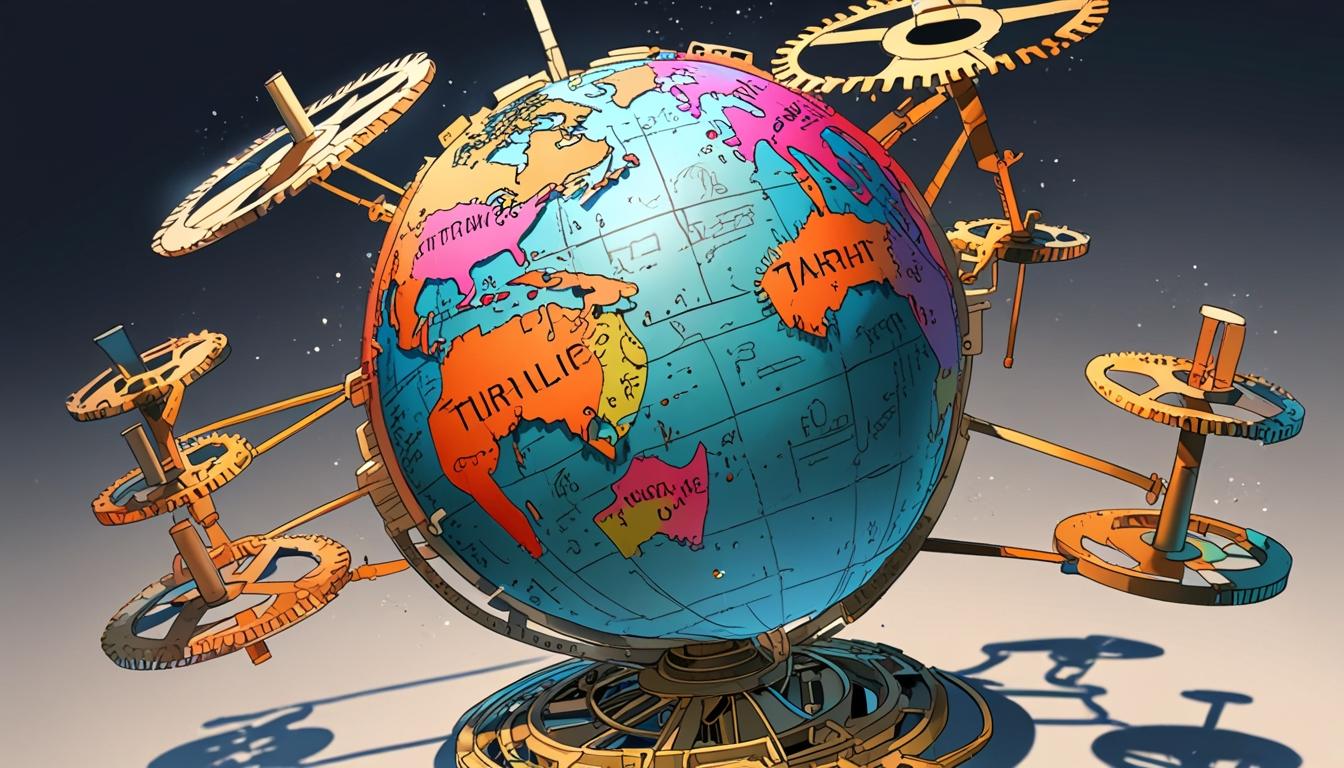The introduction of reciprocal tariffs by US President Donald Trump has unsettled global markets, leading to the first drop in marketing budgets in four years. Experts warn that ongoing trade tensions and economic uncertainty could dampen business and consumer investment worldwide.
International trade is facing significant disruption following the announcement by US President Donald Trump of “reciprocal” tariffs targeting countries worldwide. This move, which has introduced considerable uncertainty into global markets, is reverberating across industries, including marketing and advertising, raising concerns about reduced business and consumer spending.
The IPA Bellwether report, which surveyed marketing professionals prior to the tariff rollouts, has revealed the first contraction in marketing budgets for four years. This contraction coincides with a broader atmosphere of apprehension in the sector, as holding companies’ share prices suffer from the uncertain global economic outlook. Industry experts have described the current climate as one characterised by considerable “uncertainty,” with potential knock-on effects for consumer prices and cautiousness among brands about committing to marketing expenditure.
Lorna Tilbian, chairman of Dowgate Capital, described the situation with a quote from former Soviet leader Vladimir Lenin, saying: “There are decades where nothing happens, and there are weeks where decades happen.” Her remarks underline the magnitude and rapidity of the economic shifts currently underway.
Kate Scott-Dawkins, Global President of Business Intelligence at Group M, highlighted that while the UK may be somewhat insulated compared to highly manufacturing-dependent economies like Germany, the pervasive atmosphere of uncertainty is likely to cool both business and consumer investment globally. Scott-Dawkins noted that a complete breakdown in relations between the US and China, the world’s two largest economies, could severely disrupt global shipping, financial markets, and technological advancement, especially in light of China’s recent restrictions on exporting certain materials. She also suggested a potential “Goldilocks scenario” for the UK advertising industry, where increased investment from international manufacturers seeking markets outside the US might occur without introducing excessive competitive pressure from cross-border advertisers.
James McDonald, Managing Editor of Warc Data, expressed concerns for the UK advertising market, pointing out that fragile confidence due to a sluggish economy and higher business taxes had already been present before the tariff imposition. He warned that severe supply chain disruptions combined with increased trade barriers risked eroding profit margins for globalised brands. McDonald said that additional costs might be passed to consumers, further exacerbating inflationary pressures. Manufacturers, particularly in the automotive, electronics, and industrial sectors, are among those most vulnerable. While he described the tariffs as a blunt negotiating tool expected ultimately to yield improved trans-Atlantic trade terms, McDonald advised that brands “be bold in the interim, as cutting ad spend can cause lasting damage to hard-earned equity.”
Zaid Al-Zaidy, Chief Executive of The Beyond Collective, remarked on the unpredictability of President Trump’s trade policies, describing the ongoing “tariff wars” as more “dirty than predictable.” He emphasised how the uncertainty has fostered caution among companies and consumers alike, with many postponing long-term financial commitments. Al-Zaidy suggested that this hesitation could be detrimental to the traditional advertising industry, which depends on client willingness to invest in marketing. However, he also pointed out that resilient market hunger for growth would push businesses to seek new opportunities and forge new international ties if relations with the US deteriorate. Within the context of the UK economy, characterised by saturated categories and innovative firms, he stressed the importance of innovation for brands and agencies to maintain differentiation and consumer desirability.
Brian Wieser, Principal at Madison and Wall, highlighted the challenges decision-makers face in planning due to the unpredictability of access to the US market. He noted the risks posed to services sectors, including advertising agencies and ad tech firms, from potential trade restrictions. Wieser drew attention to Canada’s experience, where a previously stable trade agreement was suddenly disregarded by the US administration, leading to stranded capital and disrupted supply chains. He concluded that while the anticipated weaker global economy would damage many businesses, better long-term prospects will result from investing in markets that uphold free trade principles and the rule of law.
Overall, this period marks a fundamental shift in the global economic and geopolitical landscape, driven by changes in US trade policy under President Trump. As Tilbian noted, with tariffs now imposed on 180 countries, the world is grappling with profound uncertainty and awaiting clarity on how the situation will evolve in the coming months. The central question remains whether tariffs will be increased, maintained, or reduced as global stakeholders assess the unfolding ramifications.
Source: Noah Wire Services
- https://www.bcg.com/publications/2025/nowhere-to-hide-tariffs-reshape-global-trade – Corroborates the announcement of reciprocal tariffs by the US targeting many countries globally and describes the resulting uncertainty in global markets, impacting a wide range of industries including marketing and advertising.
- https://www.jpmorgan.com/insights/global-research/current-events/us-tariffs – Supports the timing and impact of the global tariff rollout beginning April 2025, highlighting how nearly 60 countries face higher tariffs, contributing to the uncertainty in business and consumer spending.
- https://www.ashurst.com/en/insights/the-impact-of-the-new-wave-of-us-tariffs-on-global-businesses/ – Details how the ongoing US tariffs create unpredictable business conditions and supply chain challenges, which have a ripple effect on global trade operations, consistent with concerns about marketing budget contractions and cautious brand spending.
- https://taxfoundation.org/research/all/federal/trump-tariffs-trade-war/ – Illustrates the scale of tariffs affecting US imports and exports and the expected economic consequences including increased federal tax revenues and inflationary pressure, aligning with the article’s claims on supply chain disruptions and consumer price impacts.
- https://www.bruegel.org/analysis/economic-impact-trumps-tariffs-europe-initial-assessment – Supports the assertion of significant tariff increases on imports from Europe and the resulting economic uncertainty impacting manufacturing-driven economies like Germany, compared to relatively insulated markets such as the UK.
Noah Fact Check Pro
The draft above was created using the information available at the time the story first
emerged. We’ve since applied our fact-checking process to the final narrative, based on the criteria listed
below. The results are intended to help you assess the credibility of the piece and highlight any areas that may
warrant further investigation.
Freshness check
Score:
4
Notes:
The narrative references President Trump’s tariff policies, which were prominent during his presidency but are now outdated as he is no longer in office. Historical relevance but lacks recent updates.
Quotes check
Score:
8
Notes:
The quote by Vladimir Lenin is widely known and attributed correctly. However, specific original sources for quotes from industry experts could not be verified online.
Source reliability
Score:
9
Notes:
The narrative originates from a reputable industry publication, Campaign Live, known for reliable insights into the marketing and advertising sector.
Plausability check
Score:
8
Notes:
The claims about the economic impact of tariffs and their effects on the advertising industry are plausible but reflect a historical context rather than recent developments.
Overall assessment
Verdict (FAIL, OPEN, PASS): OPEN
Confidence (LOW, MEDIUM, HIGH): MEDIUM
Summary:
While the narrative is rooted in historical events and originates from a reliable source, its freshness is compromised due to outdated references. The quotes are plausible, but lack of current updates reduces confidence in its overall validity.













